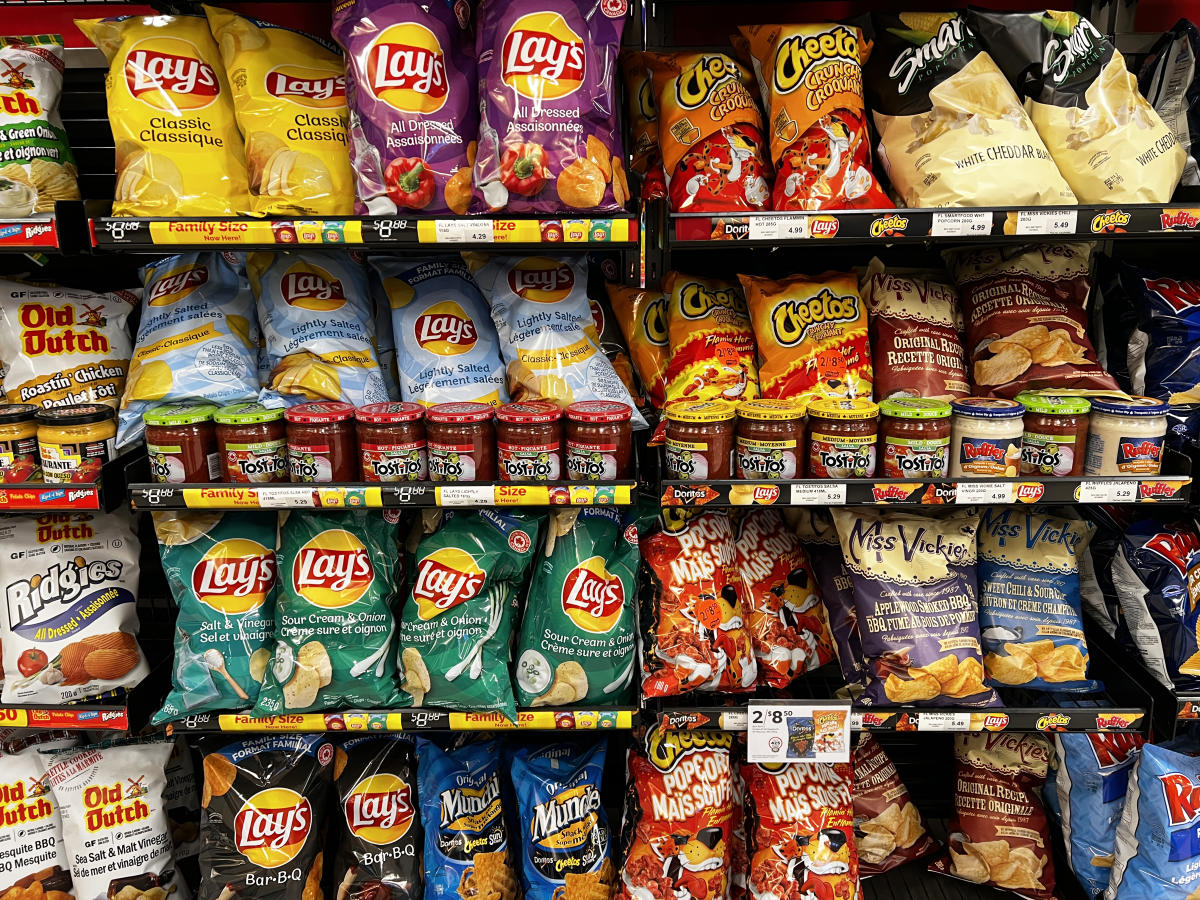This is The Takeaway from today’s Morning Brief, which you can sign up to receive in your inbox every morning along with:
The investor appetite for big food stocks is as thin as I was back in the mid-1980s.
Note in that time period I was about five years old.
“From a generalist investor standpoint, I would say it has been pretty quiet [around packaged food names]. Your typical kind of institutional money has been quieter in the space,” youthful, energetic packaged food analyst at Bank of America Peter Galbo said on Yahoo Finance’s Opening Bid podcast (video above; listen below).
The way Galbo explained it to me, investors are in search of faster-growth stocks ahead of a prolonged stretch of Fed rate cuts. Think of the desire to devour Nvidia (NVDA) shares on any dip, as opposed to eating up General Mills (GIS) on a pullback.
You can easily see that in some Yahoo Finance-sourced data.
Nvidia’s stock is up a sizzling 168% year to date. General Mills is only up 10%. PepsiCo (PEP) and Conagra Brands (CAG) are both up roughly 2%. Hormel (HRL) is down 4%.
The S&P 500 (^GSPC) is up 21% this year, the Dow Jones Industrial Average (^DJI) 13%, and the Nasdaq Composite (^IXIC) 20%.
But as I digested (pun intended) my in-depth chat with Galbo, I think there are a few other fundamental reasons that are keeping these companies out of investor shopping baskets (pun also intended).
Your shopping list of explanations:
-
The companies are still too big inside an investing world that’s no longer rewarding the conglomerate model. Investors want focused strategies executing at the highest level. For instance, does Conagra Brands need to be selling frozen food and also hawking Slim Jim and Duke’s meat snacks? Should Spam maker Hormel have purchased the Planters nut business from Kraft Heinz (KHC) a few years ago?
-
The companies want to get even bigger despite investors not rewarding the play! Conagra Brands just purchased the Fatty meat snacks line. The company now has the meat snacks market cornered with Slim Jim, Duke’s, and Fatty. Galbo tells me meat snacks are a growth category in snacking. Fair, but I question why one must own three meat snack brands!
-
The companies are slow to slim down their slower-growth businesses. Only recently did General Mills sell off its North American yogurt business for $2 billion. Campbell Soup is hunting for a buyer for the Noosa yogurt business it got with its Rao’s business. I didn’t get the sense from Hormel’s latest earnings call it’s going to sell the Planters business amid signs the deal may not be working out as planned.
-
Consumers are pissed off at Big Food for its pricing strategies and are voicing their views by purchasing less. You saw that in PepsiCo’s volumes this week.
-
The cumulative effects of four years of inflation continue to pressure so many households. Buying snacks is now a luxury.
-
Traffic at convenience store stores has really trailed off the past year for economic reasons, but shopping has also shifted to club stores such as Costco (COST). Convenience store channels need to be doing well for a lot of food players to do well.
-
The Ozempic threat on the long-term health of Big Food earnings power is rising every single day as new users of these drugs enter the market.
Bonus reason: The stocks aren’t valued for the realities listed above. They are still being seen as defensive value plays since the companies sell food.
That’s the wrong way to think about it, I believe — it’s hard to defend Hormel trading at almost 19 times forward earnings, which isn’t too far removed from the S&P 500’s forward multiple around 21 times. An old rule of thumb in investing is that a 15 times forward P/E multiple is on the attractive side (I caution this is not always the case and each company is unique, so don’t use my line as gospel).
Then, there is raw commentary that I would argue is weighing on the sector’s multiples.
First up: These companies have become political punching bags this election season. Vice President Kamala Harris has vowed to tackle price gouging by Big Food if she wins the White House in November.
Senator Elizabeth Warren has been making the rounds talking about shrinkflation and taking food companies to task for it.
All of this rhetoric doesn’t exactly embolden investors to go search for diamonds in the rough in the food space.
There is also what we are hearing from consumer company executives, which suggests a strong rebound in sales and earnings isn’t guaranteed in 2025.
“We see that [the] consumer is very challenged, and that the consumer is making a lot of decisions. They’re optimizing their full budget, so they might be cutting on food to pay for their subscriptions, or they might be cutting on food to go to see movies on the weekend. Really, there is a lot of trade-offs they’re making when it comes to food.” PepsiCo chairman and CEO Ramon Laguarta told me this past week moments after earnings hit the wires.
The company trimmed its full-year sales outlook.
This aligns with what Walmart (WMT) CEO Doug McMillon told me last week at the retailer’s Bentonville, Ark., HQ.
“People at lower income levels are always more challenged. They have to make trade-off decisions, and that’s been, I think, more acute since this inflationary cycle on the heels of the pandemic. So, a household income below $100,000 feels pressure in a way that they might not have a few years ago, and you can see that in their behavior. And we are trying to get prices down … some of the more stubborn inflation has been in the prepared foods, dry grocery type, consumable categories, like paper goods, cleaning supplies,” McMillon said.
I wish Big Food well in regaining the hunger of investors. After all, these companies do feed the planet. It will be tough, however.
Three times each week, I field insight-filled conversations with the biggest names in business and markets on Opening Bid. Find more episodes on our video hub. Watch on your preferred streaming service. Or listen and subscribe on Apple Podcasts, Spotify, or wherever you find your favorite podcasts.
Brian Sozzi is Yahoo Finance’s Executive Editor. Follow Sozzi on X @BrianSozzi and on LinkedIn. Tips on deals, mergers, activist situations, or anything else? Email brian.sozzi@yahoofinance.com.
EMEA Tribune is not involved in this news article, it is taken from our partners and or from the News Agencies. Copyright and Credit go to the News Agencies, email news@emeatribune.com Follow our WhatsApp verified Channel




